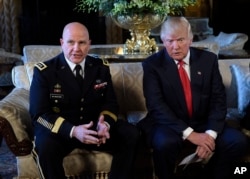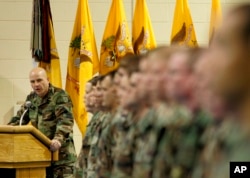H.R. McMaster, on his way out as White House national security adviser, was once described as possibly the 21st-century Army's pre-eminent warrior-thinker.
President Donald Trump announced Thursday that McMaster would be replaced by former U.S. Ambassador to the U.N. John Bolton — and shortly after that, McMaster made an announcement of his own:
"After 34 years of service to our nation,” the lieutenant general said, “I am requesting retirement from the U.S. Army effective this summer, after which I will leave public service."
He said he was thankful to Trump and "especially proud to have served alongside the men and women of the National Security Council staff, who established a strong foundation for protecting the American people, promoting American prosperity, achieving peace through strength and advancing American influence."
A White House official told VOA that the president and McMaster had mutually agreed upon McMaster's resignation, after discussing it for some time. The official said the president asked McMaster to stay on until mid-April to ensure a smooth transition, and McMaster agreed.
'True soldier-scholar'
Trump's statement Thursday said McMaster "helped develop our America First national security strategy, revitalize our alliance with the Middle East, smash ISIS [Islamic State militants], bring North Korea to the table and strengthen our nation's prosperity." The president thanked McMaster for his service and wished him and his family "the very best."
White House Chief of Staff John Kelly also released a statement calling McMaster "a fine American and military officer. ... A true soldier-scholar, his impact on his country and this government will be felt for years to come."
McMaster, one of several Trump advisers with military backgrounds, became the country's 26th national security adviser and Trump's second. He assumed the role about a month after Trump took office in January 2017, replacing Michael Flynn, who was ousted after misleading White House officials about contacts with Russians.
McMaster sat alongside Trump and the two shook hands as the appointment was announced at Trump's Mar-a-Lago estate in Florida. In making the announcement, Trump described McMaster as "a man of tremendous talent and tremendous experience," and one who is "highly respected" by everyone in the military.
"You're going to do a great job," Trump said at the time.
The Senate later confirmed McMaster to continue to serve in the Army, at the rank of lieutenant general, while also serving as national security adviser.
But news reports say that in his White House role, McMaster has disagreed with the president on a number of issues and clashed with other senior officials, including Kelly and Defense Secretary Jim Mattis.
He has been described as an iconoclast.
In 2014, Time magazine named McMaster as one of its "100 Most Influential People" and said he might be the 21st-century Army's pre-eminent warrior-thinker. Time described McMaster as the rarest of soldiers, one who "has repeatedly bucked the system and survived to join its senior ranks." The magazine called him "the architect of the future U.S. Army."
Silver Star in Gulf War
A graduate of the U.S. Military Academy, known as West Point, McMaster earned a Silver Star for leadership during the Persian Gulf War when, as a cavalry commander, he led a small contingent of U.S. tanks to destroy 80 Iraqi tanks and other vehicles.
Years later, during the Iraq War, McMaster commanded the 3rd Armored Cavalry Regiment in its mission to remove insurgent fighters from Tal Afar. The tactics McMaster employed in securing the city were seen as pioneering at the time.
McMaster's other credits include authoring the book Dereliction of Duty, which looked at U.S. involvement in the Vietnam War. In the book, McMaster castigates the Joint Chiefs of Staff for failing in their duty to provide President Lyndon Johnson with adequate military advice during the war.
The book was born from his dissertation. McMaster has a doctorate in history from the University of North Carolina at Chapel Hill. The book has since become recommended reading for all Army officers.











